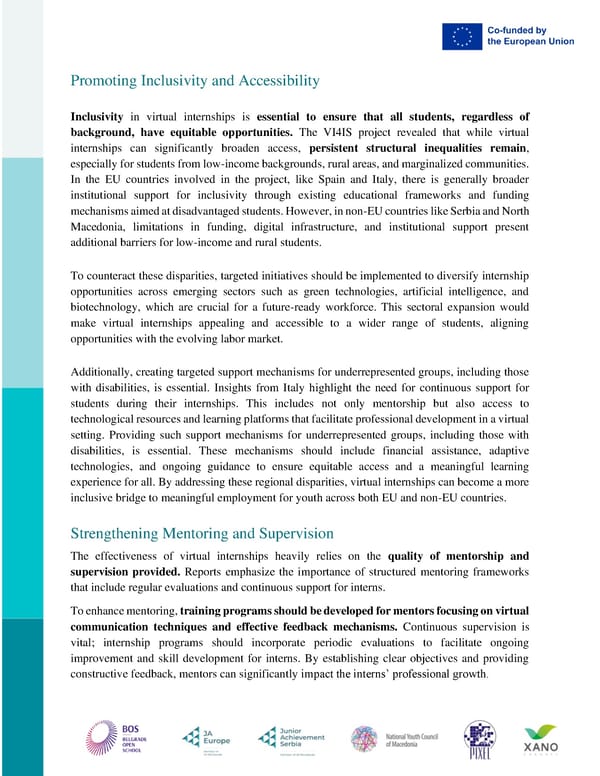Promoting Inclusivity and Accessibility Inclusivity in virtual internships is essential to ensure that all students, regardless of background, have equitable opportunities. The VI4IS project revealed that while virtual internships can significantly broaden access, persistent structural inequalities remain, especially for students from low-income backgrounds, rural areas, and marginalized communities. In the EU countries involved in the project, like Spain and Italy, there is generally broader institutional support for inclusivity through existing educational frameworks and funding mechanisms aimed at disadvantaged students. However, in non-EU countries like Serbia and North Macedonia, limitations in funding, digital infrastructure, and institutional support present additional barriers for low-income and rural students. To counteract these disparities, targeted initiatives should be implemented to diversify internship opportunities across emerging sectors such as green technologies, artificial intelligence, and biotechnology, which are crucial for a future-ready workforce. This sectoral expansion would make virtual internships appealing and accessible to a wider range of students, aligning opportunities with the evolving labor market. Additionally, creating targeted support mechanisms for underrepresented groups, including those with disabilities, is essential. Insights from Italy highlight the need for continuous support for students during their internships. This includes not only mentorship but also access to technological resources and learning platforms that facilitate professional development in a virtual setting. Providing such support mechanisms for underrepresented groups, including those with disabilities, is essential. These mechanisms should include financial assistance, adaptive technologies, and ongoing guidance to ensure equitable access and a meaningful learning experience for all. By addressing these regional disparities, virtual internships can become a more inclusive bridge to meaningful employment for youth across both EU and non-EU countries. Strengthening Mentoring and Supervision The effectiveness of virtual internships heavily relies on the quality of mentorship and supervision provided. Reports emphasize the importance of structured mentoring frameworks that include regular evaluations and continuous support for interns. To enhance mentoring, training programs should be developed for mentors focusing on virtual communication techniques and effective feedback mechanisms. Continuous supervision is vital; internship programs should incorporate periodic evaluations to facilitate ongoing improvement and skill development for interns. By establishing clear objectives and providing constructive feedback, mentors can significantly impact the interns’ professional growth.
 Policy Recommendations Page 6 Page 8
Policy Recommendations Page 6 Page 8